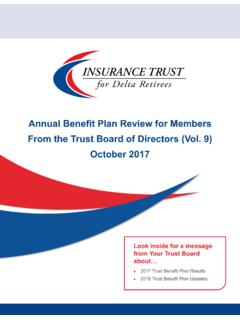Transcription of Board, Subsidiary Board and Director Responsibilities
1 Tab 2 April 8, 2016 Page 1 of 2 Board , Subsidiary Board and Director Responsibilities 1 Roles and Responsibilities of the trust Board The Board of Directors acts collectively and exercises its powers and Responsibilities as a group. The Board of Directors is responsible for governing the trust effectively and responsibly. The Board s Responsibilities for trust governance include, but are not limited to, the following: adhering to those principles set out in the Overview to the Governance Policies and Guidelines [Tab 1]; fostering the short and long-term success of the trust ; ensuring that all major issues affecting the business and affairs of the trust are given proper consideration; carrying out the Responsibilities set out in these Governance Policies and Guidelines; appointing, monitoring and evaluating the President and CEO; ensuring there is adequate and appropriate involvement from Basin residents in trust activities; approving a strategic plan (including the Columbia Basin Management Plan), annual business plan and budgets; ensuring appropriate financial controls are in place; preparing an annual report, including audited financial statements.
2 And establishing certain policies, ensuring they are implemented and periodically reviewing those policies. These policies include, but are not limited to, the following: o Code of Conduct o Investment o Policies related to the Delivery of Benefits o Communications o Human resources and compensation Where subsidiaries are operating companies ( Subsidiary ), the trust Board s roles and Responsibilities for Subsidiary governance include, but are not limited to, the following: approving creation of subsidiaries, including Subsidiary name; defining an appropriate governance structure and authorizing the appointment of Directors; approving mission, vision, strategic plan, and other high level performance expectations; approving funding allocations; ensuring Subsidiary activities, roles and overall direction are consistent with the trust s mission and the needs of Basin communities.
3 Receiving reports on performance and periodically assessing progress towards achieving objectives; appointment of Subsidiary Chair and its President and CEO; and, audit oversight through the trust s Finance and Audit Committee. Tab 2 April 8, 2016 Page 2 of 2 2 Roles and Responsibilities of Subsidiary Board of Directors Subsidiary Board of Directors act collectively and exercise its powers and Responsibilities as a group. Subsidiary Board of Directors is responsible for governing their Subsidiary effectively and responsibly. Where subsidiaries are operating companies, their Board of Directors roles and Responsibilities include, but are not limited to, the following: advising on the overall strategic direction of the Subsidiary , and recommending approval of same, to the trust Board ; proposing amendments to the mission, vision, strategic plan and other high level performance objectives to the trust Board as appropriate; approving business and action plans consistent with the mission, vision, strategic objectives and other high level performance expectations; prioritizing activities and resources in the manner best judged to achieve objectives; reviewing and approving annual budgets within trust approved funding allocations; providing feedback on the performance of the Subsidiary ; approving the Subsidiary s officers, other than the Chair and the President and CEO.
4 Assessing the reasonability of the Subsidiary s expenditures; and, reviewing and approving the Subsidiary s financial statements. 3 Roles and Responsibilities of Directors Each trust and Subsidiary Director must ensure that he or she discharge all of the duties described in these Governance Policies and Guidelines, and act in a manner that is consistent with the Governance Principles.









